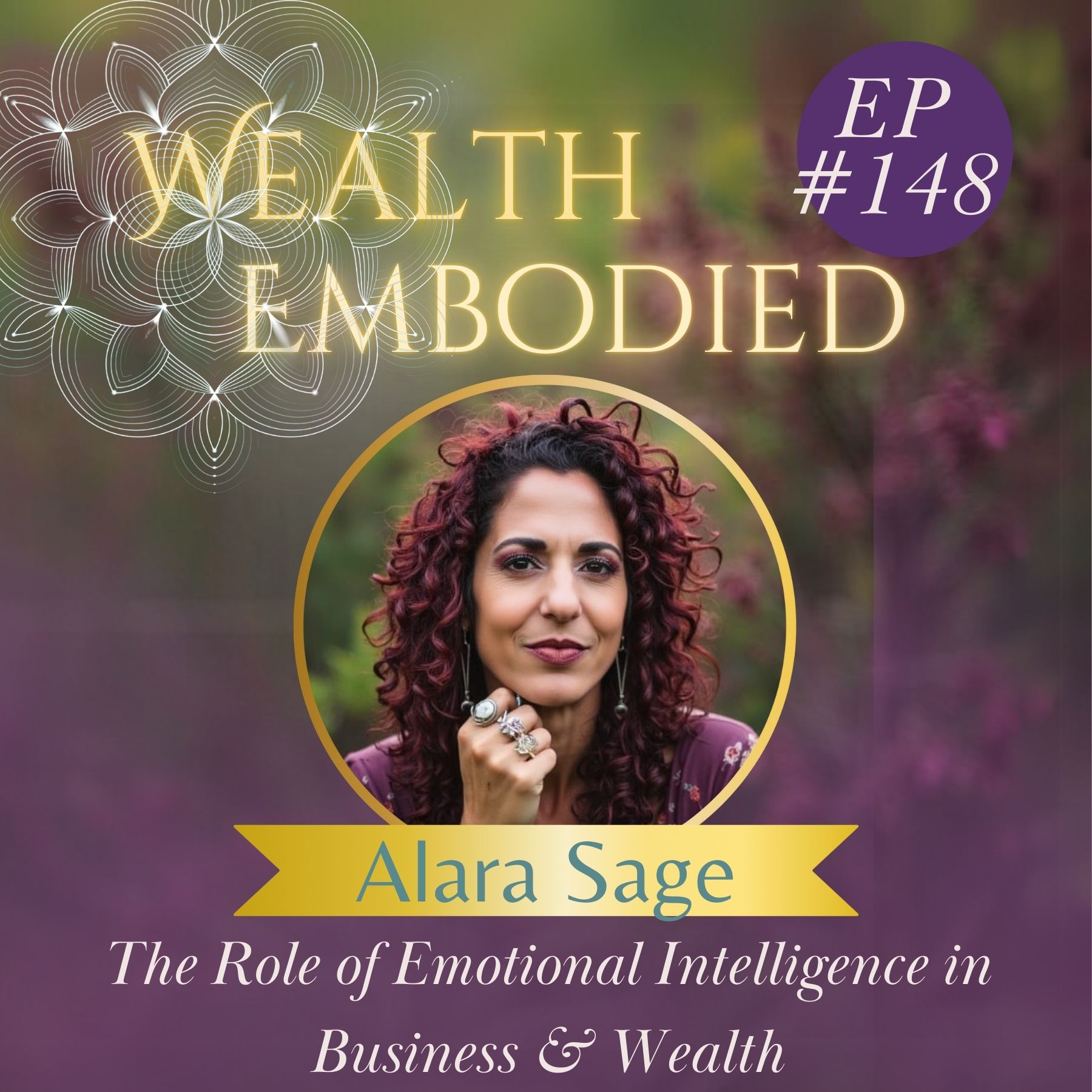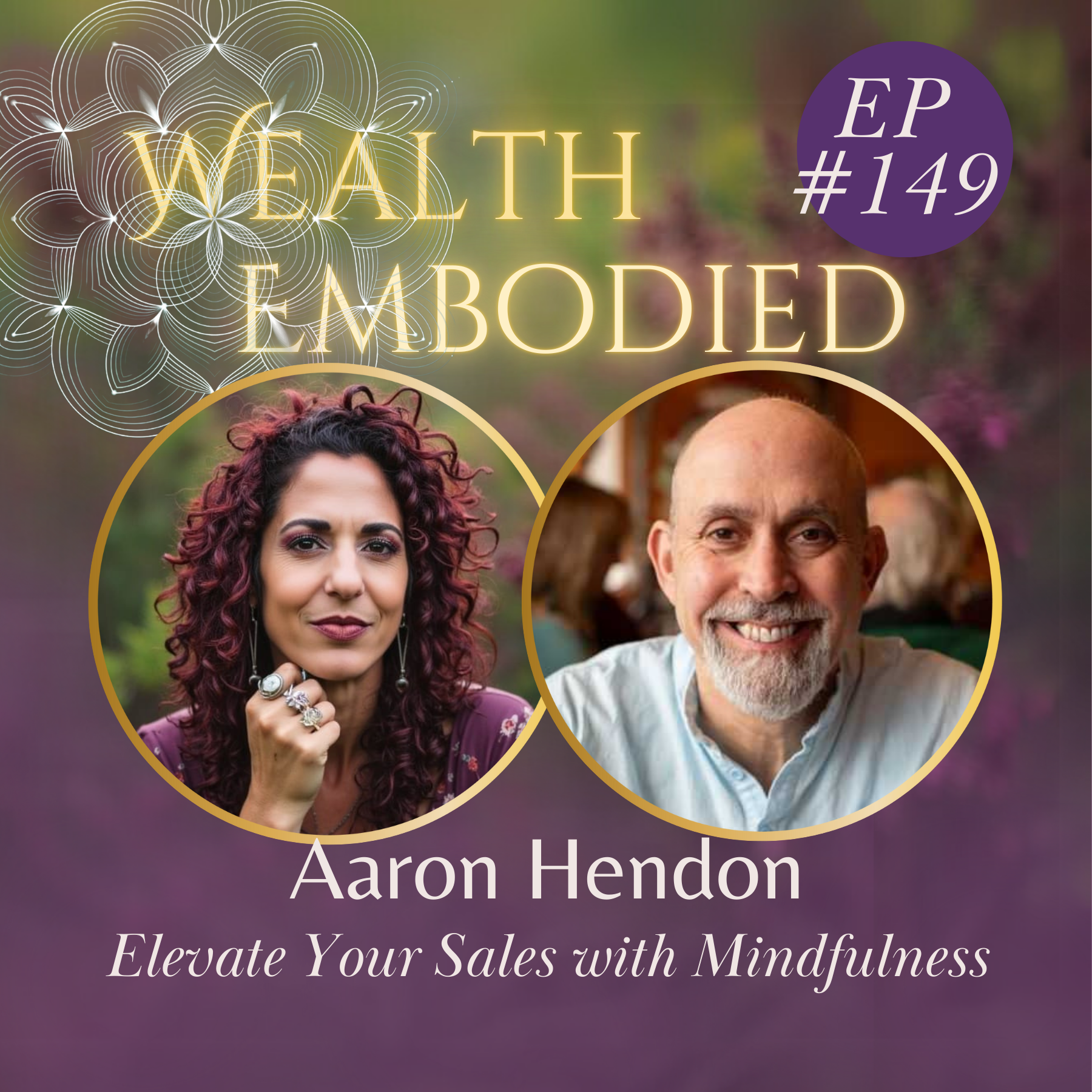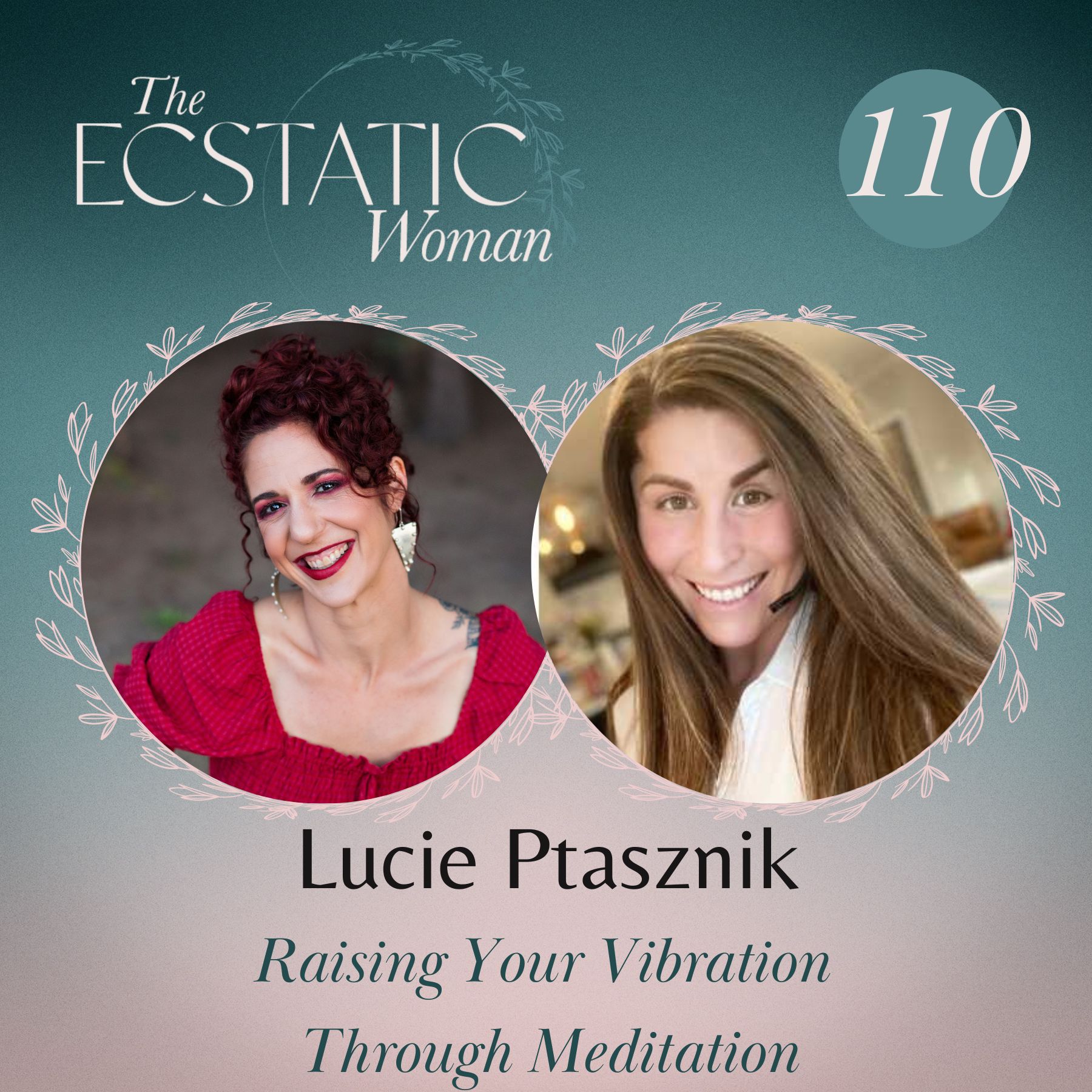Episode Transcript
Alara Sage (00:02.052)
Hello, hello, and welcome to another episode of Wealth Embodied, where we activate and inspire you in wealth consciousness, your creative genius, and your visionary impact. I'm your host, Alara Sage. I am the Oracle of Wealth. I'm a trusted advisor and a business psychic. I help visionary leaders and entrepreneurs to recognize where there are barriers
resistance blocks within their business, in their organization, in their teams, in their revenue flow, and we turn those into wealth breakthroughs. And today I want to talk about, this is a solo episode, it's just you and me, and I want to talk about the role of emotional intelligence in both business and wealth.
Alara Sage (00:55.01)
Understanding that money is a very emotional trigger for humans.
Money is very emotionally charged is another way of saying it. For the vast majority of humans, they are holding on to subconscious belief structures around money. Those belief structures could be that there isn't a lot of money, there is a lack.
Those belief structures could be that you have to grind, you have to work really hard in order to receive money, in order to be wealthy. Those belief structures could be that one's value, one's worth is rooted in how much money they have and infinite beliefs between all of those.
And those belief structures create emotional reactions when a person is dealing with money, thinking of money, having an experience with money in their personal life and their business.
And this is really important to understand as a leader, an entrepreneur, because it's very obvious, you know, the old way of marketing. And I am always referring to the old way and the new way, because that's where we are. We're at a precipice of change. We're actually already in the new era. We're just not yet seeing it in our physical reality because it starts energetic. But in the old way,
Alara Sage (02:41.054)
marketing played on people's emotions and used that emotional state and truly the lack of emotional intelligence of most humans to get them to buy things. It was manipulative and coercive and it was effective. That's just the truth of it. Was it of integrity? Absolutely not.
Right. And I'm not saying all marketing was like that or is like that. Absolutely not. I'm just pointing to the truth that that has been there using tactics like FOMO, right? Using tactics of emphasizing fear, lack, portraying that value, that success, right? And playing with those emotional states.
in marketing in order to achieve the results.
And this is where emotional intelligence really comes in, because when you are not aware of your emotion. So let's first define what emotional intelligence is. Emotional intelligence is the ability to recognize first and foremost that you're feeling something. Some people don't even have that ability. They are so shut down that they don't recognize that they are feeling strong emotions. They will.
distract themselves externally because of the inability to really represent and work with the emotions that they're feeling.
Alara Sage (04:27.748)
So emotional intelligence is first and foremost ability to recognize that you're feeling something and then the ability to recognize what you are feeling, right? To be able to put a word to it, to feel the difference, recognize, have the awareness of the difference between different emotions and recognize when you're in those different emotions. And then ultimately mastery of emotional intelligence is where you can be the observer.
of your emotional self, no matter what emotions you are feeling, you are simply observing those motions, allowing those motions to move through your body, not suppressing them, but simultaneously not identifying with them, okay? Observing them. That is a high level of emotional intelligence. So when we are emotionally intelligent,
as leaders and as entrepreneurs, first and foremost, we are aware of our own triggers around money and how that affects our business, right? So for instance, if money is getting low in the business, is there a trigger of scarcity that then ends up a domino effect in creating a product or a service or
doing something in order to get that money that may or may not really be in alignment with the values and integrity of the business. Whereas an emotionally intelligent entrepreneur leader will be able to recognize that they're feeling that anxiety, that tension, that fear. And as holding that observer,
being the observer, the witness of their emotions, they're going to be able to make decisions from a place of neutrality instead of from a place of emotion. And this is what really delineates the highly successful entrepreneurs, visionary leaders who can manage a lot of stress and those who cannot.
Alara Sage (06:50.746)
Right. So that high level of emotional intelligence allows you to respond to your environment, respond to the issues in your business, respond to how wealth is representing itself in your business and in your life rather than react. Right. So react is that emotional state where from that emotion you are
than taking action to that circumstance. And this is where, when we're in that reactionary state, this is when we look back and we think, that wasn't a very good decision, right? Or we look back and we recognize that we were emotional and where that led us, because it usually doesn't lead us where we truly desire to go. The actions that we take from that emotional state usually do not
create the outcomes that we truly desire.
Alara Sage (07:55.896)
So as a visionary entrepreneur or leader, it's really your responsibility to learn to have that emotional intelligence for yourself so that you can be making those decisions for your business based off of the core values and integrity rather than the emotions that are being elicited via the triggers of your limiting belief structure.
Alara Sage (08:25.998)
Where it also comes very strongly into play, where emotional intelligence comes very strongly into play, is with teams and working with people, right? Helping your team function together. Because again, a leader who is emotionally intelligent, and this is something I should have said in the definition of emotional intelligence, it's not just that you can recognize your own emotions.
You can sense, feel and recognize the emotions in other people as well. And that is very powerful because the amount of people who are still reacting in an emotional state is very high. So when you're working with a team and something is causing some friction conflict, which conflict in and of itself is actually a very positive energy. Conflict creates expansion. It creates evolution.
However, when conflict is rooted or is experienced, let me say, in a lack of emotional intelligence, it often just implodes in on itself. You don't actually end up expanding or evolving because the conflict triggers so much emotion and the reactions and the actions of people participating in that particular conflict.
are reactionary. So everybody is reacting from their emotional state and triggering each other. And it just kind of blows up or implodes on itself. So as a visionary leader, when you are emotionally intelligent, you can feel any triggers that are happening to yourself, any emotional states that you are experiencing. Plus you can experience, see, feel the emotional states of the other people.
That is a lot of clarity. And through that ability to witness your own emotions, you actually have the ability to what's called hold space for yourself and that emotional state as well as your team. So what does that mean? That it means that you can allow everybody to experience their emotions. You're not trying to shut it down. You're not trying to shut them off. Of course, all respectfully.
Alara Sage (10:47.736)
Right, people don't need to be screaming at each other or yelling or calling each other names, but respectful expression of one's emotions are very, very healthy. So as the leader, you can allow all of that to happen and you can really lead the group through the process of recognizing their emotions, moving out of those emotional states, coming back to those neutral states of being, and then responding
to each other and to the conflict and the challenge from that now neutral place. emotional intelligence is invaluable, invaluable as a leader, as an entrepreneur, both for yourself, for your company, and for your relationship to wealth. Because again, as I mentioned, money is very, very charged. It's very emotionally charged.
isn't have to be that way. You can learn to create neutrality through recognizing your limiting beliefs and transmuting those and restructuring, reprogramming yourself in new belief structures. Then money can be neutral and then it can actually even be a very positive vibrational emotional state for yourself, which is very, again, very wonderful to experience, right?
regardless of whether you are relating to money in positive emotions or negative emotions, you still want to be responding. You still want to be taking action from the state of neutrality and neutrality doesn't mean that there's nothing there. The true state of neutrality is actually love. It's just not the emotion of love. It's pure acceptance. Okay. So it's the state of our divinity. It's the state of the recognition of
of all that is, that's true neutrality. And I like to make that differentiation because it's not just a lack of emotion. All right. It's actually deeply grounded in presence and simultaneously connected to your super conscious, your higher self. Okay. That's the state of neutrality. are present and grounded and simultaneously available to receive what
Alara Sage (13:13.496)
What truly wants to happen here? What guidance does your super conscious want to give you to take action on? Okay. And those that guidance will also have that neutral sense to it. So that's truly what I mean when I say neutrality at a high level of emotional intelligence. And so as a visionary entrepreneur, as a visionary leader, how do you get, how do you acquire, how do you
become emotionally intelligent.
The easiest way to practice this is first and foremost with yourself, right? Not in an environment, a situation or a circumstance where there are other people, because it is much harder to have the pause to address your own emotions when other people are involved. So to the best of your ability, anytime that you start to feel an emotion, you can either remove yourself from the circumstance or
if you are by yourself, then it's about first and foremost, always breathing into the body. Breathing into the body connects the different places of our brain, of our mind. It connects our conscious, our subconscious and our super conscious. So you want to take nice deep breaths into the belly, a couple of those nice deep breaths to center yourself and start to really open up the information that is held in your subconscious mind and recognize what am I feeling?
Right. What am I feeling? And if you can put a label to that, that's perfect. Like I'm feeling angry. I'm feeling frustrated. Right. Of course, this all happens from a place of non-judgment. Right. Emotions are part of humanity. If we're judging ourselves for feeling anger, then we are judging a part of our humanness and we are literally not allowing ourselves to be whole.
Alara Sage (15:14.756)
There's nothing wrong with feeling anger. There's nothing wrong with expressing anger. I teach my children to express anger. Just don't express it at your brother, right? Don't yell your anger, which is very sharp energy at your brother. Go into your room, go somewhere and just let the anger out. It's very, very effective. And they've learned to do that. And they've also learned how it feels. It brought awareness to how it feels when somebody's
angry at you, right? It hurts. So anger in and of itself is nothing wrong with. There's nothing wrong with any of the emotions. They're just simply vibration, their energy moving through the body. OK, so recognize what you're feeling, put a label to it so that you can understand it. And then you can take it deeper and ask, what is this emotion showing me? What is it telling me? Because emotion, the emotional.
system in our body is a guidance system. It is there to show you ultimately how you are believing something that is fundamentally not true to your being, aka a limiting belief. Somewhere a limiting belief or trauma, which will still root back to a limiting belief. It's all belief structure has been triggered and that limiting belief is eliciting emotion.
So asking what is the emotion guiding you to? What is it trying to show you about your beliefs regarding that circumstance, that experience, whatever it was, it could be something as simple as listening to somebody on the radio and you get triggered, right? It could be a in-person experience where you're with another person and you're triggered. It could be something that you do within yourself. You take an action or you set an intention.
And you're triggered, right? We can be triggered by literally anything. So that self-awareness of, and then taking it deeper into what is a limiting belief. And then it's about breathing into your body. Continue to stay consciously breathing and simply make space, allow the emotion. Okay. Again, if you need to scream, if you're, know,
Alara Sage (17:34.83)
in somewhere that you can't just scream out loud, know, grab a pillow, grab a coat, right? Scream into the coat, go out into your car, sit in the car and scream, right? Like, it doesn't matter. This can happen anywhere. So if you're already making excuses for yourself is where you cannot express a certain emotion, it's, you know, I can't possibly do that, fill in the blank, then you're already believing.
that emotions aren't safe for you to express, right? You're already believing that they're wrong, that they're wrong. They're simply wrong. They're not okay. So it's up to you to begin to reprogram yourself in that by taking action to make that spaciousness for yourself, for emotion. So breathe into your body. Just keep consciously breathing and,
to sit there with the emotion. That's all you have to do. If you consciously breathe and you sit with the emotion, observing it, not identifying with it, okay, just observing it, it will simply move through your body. And the better you become at this, the faster the emotions move. When I hit emotion, I can go into motion very deep and very intensely, and it'll be gone in a matter of a second, literally.
because I make that spaciousness in my body. And so.
Alara Sage (19:03.908)
You're not suppressing the emotion. You're not looping yourself back through, right? Emotions are meant to move through your body. You're not meant to just sit in an emotion. Meaning if you start crying and you just keep crying and keep crying and keep crying, that means you're identified with the emotion. If you're feeling anger and...
you start to let yourself feel that and then you just can't let it go, right? Like you can't move out of the state of anger. You are identifying with the anger. Okay. That is a place of circulating back through and you continue to be in that emotion. You're not allowing the motion to move through your body. Okay. So that's the difference between just being emotional
and being emotionally intelligent, and they're very, very different. Okay, so with that, and as you progress in this, you will begin to be able to notice emotion more in other people and also recognize what that emotion is, because you'll be familiar with the vibration of the emotion. Each emotion has a specific vibration. It's very, very specific, you know, like frustration and anger.
are very close together, but vibrationally they are different. You can feel what frustration feels like, and you can feel what anger feels like, and they are different. So you'll be able to recognize what other people are feeling, and you'll be able to, like I said, hold that space for them and help them to recognize their emotion, you know, breathe through their body and shift that emotion. So invaluable, right? And the better you get at this,
the more you're going to recognize really subtly how much emotion was actually running the show. Even for people who, like for instance, for me, let me use my own example here. I believed before my big spiritual awakening, I believed that I was very emotionally balanced. And what I was was emotionally suppressed. So I never let myself feel emotion.
Alara Sage (21:22.214)
or I let myself feel emotion on a very small amount of level like that, just a little bit. OK, that's enough.
That didn't stop those emotions from being in my body. This is the important thing I want you to understand. Suppressing emotion, ignoring emotion doesn't mean it goes away. It still is there vibrationally within your body. So a lot of times when I'm working with clients, I'll say, there's some anger here. There's some frustration. And they're like, really? I don't feel it. And then as I open and create space for it in their bodies,
All of a sudden they feel it. But because they had suppressed it, they're just not recognizing that it's there, but it is vibrationally there. And that means it is going to affect your decision making. It is going to affect whether you are reacting to your environment or responding to your environment. Okay. Again. So that's the difference between suppressing your emotions.
and just ignoring them is that they still have a hold on you. What we ignore that exists actually has more power over us than what we turn and we face. Okay. Just because we ignore it, we deny it, we pretend it's not there. It doesn't go away. And we actually give it our power because we're saying, yeah, I don't want to deal with you. I don't want to look at you. I don't believe I can look at you.
deal with you, handle you, right?
Alara Sage (23:16.644)
So as you become more emotionally intelligent, you will be able to see, wow, how much that emotion has actually really been running the show. That's what I saw as I went through my spiritual awakening. I recognized afterwards, and as I started to connect to my emotions and become emotionally intelligent, actually how much my emotions were completely.
taking center stage with the choices and the actions I made, I just wasn't aware of it because I wasn't allowing myself to feel any of the emotions.
Alara Sage (23:58.202)
So in summary, emotional intelligence for visionary leaders and entrepreneurs is vital. It's invaluable. This is not something if you haven't already started this practice, this isn't something that you can just not do. This is the new era of leadership is having emotional intelligence and supporting your team through emotional intelligence. And it's about responding in your business as that leader from that emotional intelligence.
with all of your actions and your decisions. So you're ensuring that your business is staying aligned to the values and staying of integrity. And this is how we do that. So absolutely hope this helped you both understand emotional intelligence and the importance of it, as well as give you some skills and tools so you can start to implement or even take this practice deeper if you already have been practicing emotional intelligence.
for yourself. And as always, I'm here to support you if you need further assistance with emotional intelligence, either for yourself or your team. I am excellent at helping entrepreneurs support their teams through these processes also. As always, thank you so much for being here with me today. I appreciate you and value you. Love you so much. Until next time.





